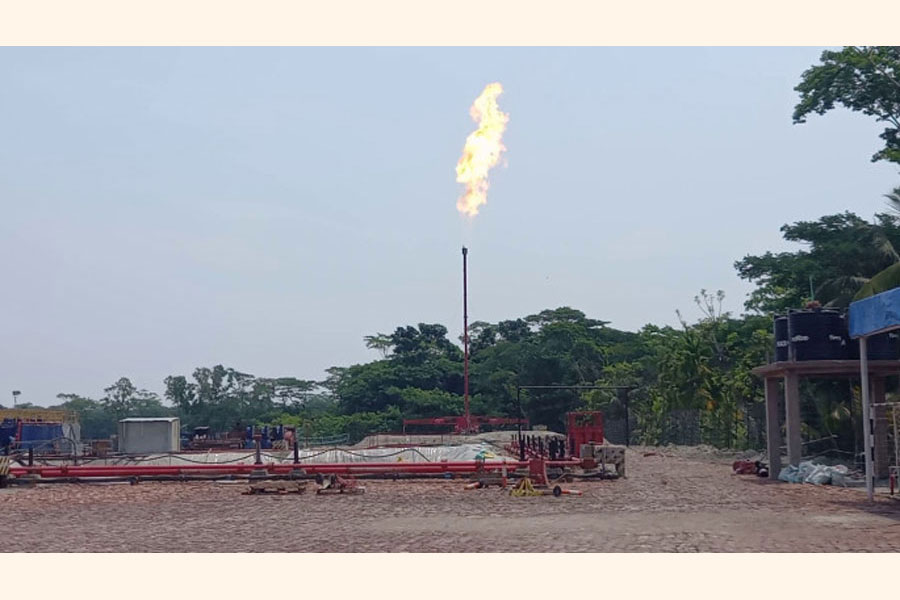
Published :
Updated :

Bangladesh has recently made an extraordinary breakthrough with the discovery of a massive 2.5 trillion cubic feet (tcf) of natural gas reserves in the Bhola district. This discovery was achieved with the technological assistance of the Russian energy giant Gazprom, marking one of the most significant finds in the country's history. This new reserve not only provides a critical boost to Bangladesh's energy security but also holds substantial implications for its geopolitical positioning in the region and beyond.
A STRATEGIC ENERGY ASSET: The Bhola gas discovery comes at a crucial time when the country is struggling with energy shortages, frequent blackouts, and a reliance on imported energy. The newfound reserves will likely lessen the country's dependency on imported Liquefied Natural Gas (LNG) from countries like Qatar and Oman. With 5.1 tcf of natural gas now in its grasp, Bangladesh has the potential to meet domestic energy needs for the coming decades, powering industries, households, and transport sectors while significantly reducing its import bills.
This energy independence will enhance Bangladesh's strategic standing within South Asia. As one of the most densely populated countries, securing a stable domestic energy supply will bolster its economic growth and help sustain its industrial sectors, particularly textiles and agriculture, which are vital contributors to the nation's GDP.
GEOPOLITICAL SHIFTS AND REGIONAL DIPLOMACY: The discovery, facilitated by Gazprom, highlights Bangladesh's evolving ties with Russia, a country that has long been a significant player in the global energy sector. This partnership could mark a shift in Bangladesh's geopolitical alliances. While traditionally maintaining close ties with China, Bangladesh's collaboration with Russia on this gas project demonstrates the intent to diversify its international partnerships.
Moreover, as Bangladesh becomes more energy-independent, its bargaining power in regional diplomatic dialogues will increase. The country could adopt a more assertive stance in negotiations over cross-border energy issues, such as the import of electricity from neighbouring India and Bhutan or future energy grid connections with Southeast Asia.
Bangladesh's increased energy production could also give it an opportunity to become a regional energy hub. The gas from Bhola could be exported to neighbouring countries, such as India and Myanmar, enhancing Bangladesh's role in South Asia's energy market.
BALANCING RELATIONS WITH MAJOR POWERS: The involvement of Gazprom in this discovery signals a deepening relationship with Russia, but it also poses a delicate balancing act in Bangladesh's foreign policy. The U.S. and China, both of which are major stakeholders in Bangladesh's development, may view the growing Russian presence with some caution.
As Russia's influence in the region grows through energy ties, Bangladesh will need to navigate its relationships carefully to avoid alienating either of these global powers. This is especially important as Bangladesh remains a beneficiary of U.S. development aid and is a key partner in China's Belt and Road Initiative (BRI).
ECONOMIC BENEFITS AND INDUSTRIAL GROWTH: From an economic perspective, the discovery could help Bangladesh boost its industrial sector and reduce energy costs. Natural gas plays a critical role in powering Bangladesh's industrial zones, particularly in the production of fertilisers, power generation, and the country's thriving textile sector. With an abundant supply of natural gas, domestic industries will become more competitive, reducing production costs and making Bangladeshi products more appealing in international markets.
Additionally, the discovery has the potential to attract more foreign direct investment (FDI) into Bangladesh's energy sector. With proven reserves, international companies may see Bangladesh as a more attractive destination for energy exploration and development projects. Such investments could lead to new job opportunities, technology transfers, and improved infrastructure in the country.
CHALLENGES AND ENVIRONMENTAL CONSIDERATIONS: While the discovery is a significant achievement for Bangladesh, it also brings new challenges. The extraction, transportation, and distribution of natural gas require significant infrastructure investment. The government will need to ensure these activities are accomplished efficiently and transparently to avoid mismanagement and corruption, issues that have plagued many resource-rich nations in the past.
Furthermore, there is growing global pressure to move away from fossil fuels towards renewable energy sources. Bangladesh, like many developing countries, faces a difficult dilemma: balancing immediate energy needs and economic development with long-term sustainability goals. The country must ensure that while it takes advantage of these newfound gas reserves, it also invests in renewable energy projects to align with global environmental commitments.
Mohammed Imran Chowdhury is an ex-banker and a financial consultant.
imranchowdhury602@gmail.com


 For all latest news, follow The Financial Express Google News channel.
For all latest news, follow The Financial Express Google News channel.